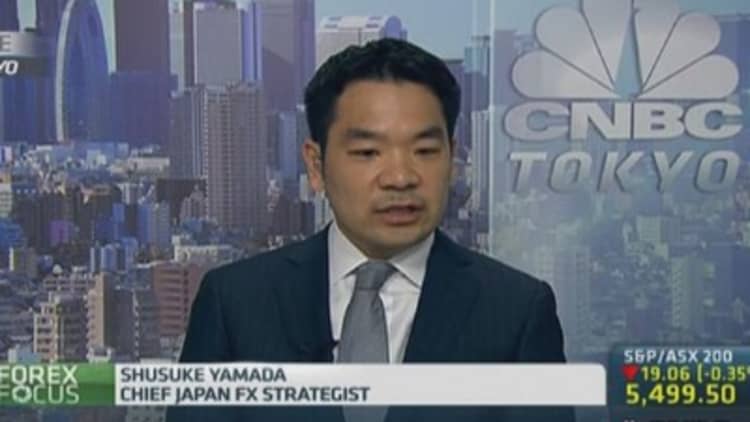The Bank of Japan (BoJ) looks set to bring no major surprises at its policy meeting this week, but the market will be keeping an ear out for any changes in Governor Haruhiko Kuroda's optimistic stance on the economy.
Despite increasing evidence of a slowdown, largely brought on by April's 3-percentage-point consumption tax hike, Kuroda has defended his upbeat view on the economy.
"We'll be looking to whether Kuroda acknowledges weakness in the data, or maintains a glass half full view," Izumi Devalier, Japan economist at HSBC, told CNBC.
Read MoreIs the BOJ asleep at the wheel?
The BoJ will announce a decision on monetary policy on Friday after a two-day meeting. Kuroda is scheduled to hold a press conference after the decision at 1530 local time on Friday.

Japan's June industrial output fell at the fastest rate since the devastating earthquake and tsunami in March 2011 as companies slowed production to offset a build-up in inventories. Meanwhile, exports unexpectedly fell for a second straight month in June, extending the nation's record-long trade deficit.
If the central bank chooses to downgrade its assessment of exports and output given increasing signs of weakness in the economy, it could renew expectations for further easing, says Kathy Lien, managing director at BK Asset Management.
Read MoreBoJ's bazooka increasingly felt around Asia
Such a move would send the yen lower, she added. The Japanese currency has risen 2.7 percent against the dollar this year, partly driven by safe-haven flows fueled by geopolitical uncertainty.
The BoJ has kept its monetary policy framework intact for 18 straight meetings since April 2013, when it launched its extraordinary asset-buying scheme. And by most counts, the central bank is unlikely to step on gas pedal until early next year.
Read MoreBOJ keeps policy steady, trims 2014 growth target
"Inflation has been stronger than previously expected, so policymakers are more likely to announce an extension of QQE [quantitative and qualitative easing] in its current form rather than an expansion in the pace of purchases," according to Marcel Thieliant, economist at Capital Economics.
"But we think that inflation will start to fall short of the BoJ's optimistic forecasts by the end of the year. Accordingly, a more aggressive version of QQE may be revealed sometime in 2015, perhaps at the April meeting," he said.
In June, Japan's core consumer price index, which excludes fresh foods, rose 1.3 percent on year after excluding the direct effect of the tax hike. The BoJ aims to lift the inflation rate to 2 percent inflation by 2015.


